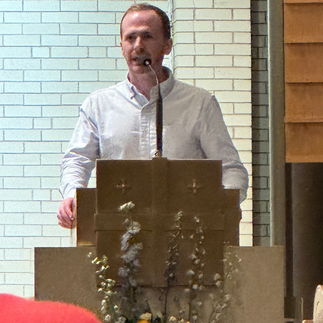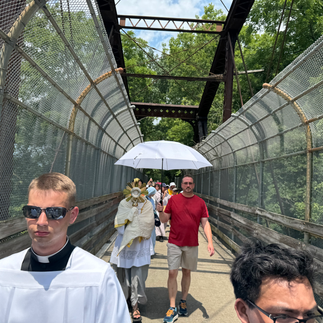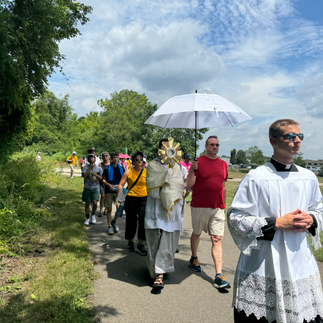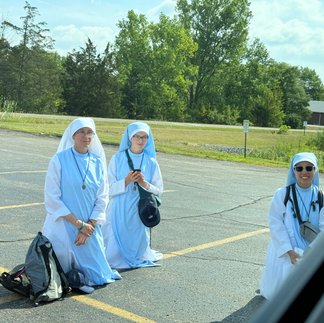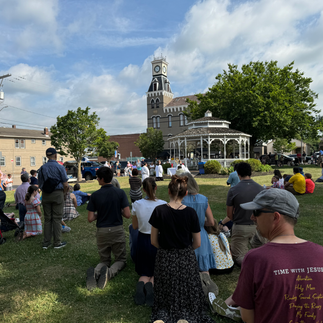Day 47 — Echoing St. Thomas the Apostle's Confession in Lebanon and Cincinnati
- SetonPilgrimage24
- Jul 3, 2024
- 3 min read
CINCINNATI, OHIO, July 3 — The Seton Route pilgrims of the National Eucharistic Pilgrimage celebrated the Feast of St. Thomas the Apostle with multiple opportunities to echo the apostle's confession of Jesus Christ as his Lord and God. They did so at Mass, two Eucharistic processions, plenty of time for adoration in their support van, and a three hour period of adoration at night.
The day began with Mass at St. Francis de Sales Church in Lebanon, where Seton Chaplain Father Roger Landry celebrated the Mass on the feast day and preached a homily on what everyone can learn from St. Thomas about better approaching Jesus in the Blessed Sacrament.
He lamented that, despite being an apostle who left everything to follow Jesus and ultimately giving his life for Jesus, Thomas is referred to by the adjective "doubting" almost as much as he is by "saint." But all of other apostles and disciples doubted Jesus' words that he would rise on the last day not to mention the witness of Mary Magdalene and the disciples on the Road to Emmaus. But Jesus permitted him to be absent so that by his confession of faith we might all be strengthened.
St. Thomas speaks three times in Sacred Scripture and, Fr. Landry said, each has an application to the Holy Eucharist.
The first is when St. Thomas, after Jesus had been informed that Lazarus was at the point of death, said, "Let us go to die with him." Thomas grasped that faith was supposed to lead to life and he was willing to give his life for Jesus, as he would. The Eucharist, Landry underlined, cannot just remain a truth of faith but must translate into a way of life.
The second is when Thomas questioned Jesus in the Gospel, saying to him, "Lord, we do not know where you are going. How can we know the way?" He shows us that we can question sincerely Jesus about what we don't understand. As St. John Henry Newman said, 1,000 questions do not constitute a single doubt. We can similarly ask questions about the Eucharist, with our faith seeking greater understanding.
The third is from the Gospel for the Feast, from the week after Easter Sunday, when Thomas is invited by Jesus to probe his wounds. Thomas cries out, "My Lord and my God," which not only is the greatest confession of Jesus' divinity in Sacred Scripture but also a sign of Thomas' personal relationship with him. We're called to make the same confession and have a similar personal friendship.
After Mass and a quick breakfast, Father Craig Best, pastor of St. Francis de Sales, carried the Lord in a large procession with about 200 people to Bicentennial Park in Lebanon, where he imparted benediction and there was adoration.
Afterward, pilgrims drove the Blessed Sacrament in their specially outfitted support van to the Lebanon YMCA, where they began a 6.5 mile pilgrimage to the Hamilton County Park Trail Head. The pilgrimage took place in 91 degree temperatures in the direct sun.
At the end of the procession, Seton Chaplain Father Joseph Michael Fino, CFR, gave Eucharistic Benediction and the Blessed Sacrament was put in the support van to be transported to St. Gertrude Parish in Madeira. At night at St. Gertrude there was a three hour period of adoration, during which pilgrims Christoph Bernas and Brother Lazzarus Vina, CFR, gave testimonies and Will Peterson, Director of the National Eucharistic Pilgrimage who had just arrived to see the Seton Route in action, gave an overview of the pilgrimage. Christoph Bernas spoke about the important of adoration in his life and Br. Lazarus spoke about prioritizing prayer with Jesus.






